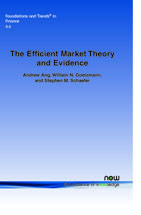The Efficient Market Theory and Evidence: Implications for Active Investment Management
By Andrew Ang, Ann F. Kaplan Professor of Business, Columbia Business School, USA, aa610@columbia.edu | William N. Goetzmann, Edwin J. Beinecke Professor of Finance and Management Studies, Yale School of Management, USA, william.goetzmann@yale.edu | Stephen M. Schaefer, Professor of Finance, London Business School, UK, sschaefer@london.edu
Abstract
The Efficient Market Hypothesis (EMH) asserts that, at all times, the price of a security reflects all available information about its fundamental value. The implication of the EMH for investors is that, to the extent that speculative trading is costly, speculation must be a loser's game. Hence, under the EMH, a passive strategy is bound eventually to beat a strategy that uses active management, where active management is characterized as trading that seeks to exploit mispriced assets relative to a risk-adjusted benchmark. The EMH has been refined over the past several decades to reflect the realism of the marketplace, including costly information, transactions costs, financing, agency costs, and other real-world frictions. The most recent expressions of the EMH thus allow a role for arbitrageurs in the market who may profit from their comparative advantages. These advantages may include specialized knowledge, lower trading costs, low management fees or agency costs, and a financing structure that allows the arbitrageur to undertake trades with long verification periods. The actions of these arbitrageurs cause liquid securities markets to be generally fairly efficient with respect to information, despite some notable anomalies.
The Efficient Market Theory and Evidence
The efficient market theory asserts that the price of a security reflects all available information about its fundamental value. A consequence of the theory is that it is impossible to consistently beat the market and speculation must be a loser's game. Hence, an indexing strategy is bound to eventually beat a strategy that uses active management, where active management is characterized as trading that seeks to exploit mispriced assets. The Efficient Market Theory and Evidence reviews the extensive theoretical and empirical literature on the efficient markets hypothesis (EMH). The authors base their review on the implications of the EMH for the practice of active investment management. Beginning with a brief discussion of current efficient market theory, the authors present the theoretical foundation and discuss the recent empirical evidence on efficiency as it pertains to a range of different markets - not simply the large, liquid public securities markets but also the private capital markets. The Efficient Market Theory and Evidence suggests that while tests of the theory on prices have produced violations suggestive of the potential for active management to add value to a multi-asset portfolio, finding consistent out-performing active managers is difficult. Since the most recent versions of the EMH emphasize the comparative advantages of specialized arbitrageurs due to better information, skill, lower trading costs, and better access to financing, the balance between indexation and active management is a choice that depends on beliefs about the existence and potential of manager skill, the pricing opportunities afforded within a given market, the time preferences and risk aversion of the investor, and the expertise and incentive contract of the specific manager.
